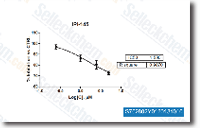This can be in ac cordance with our past data, which showed that TGFBI suppresses tumorigenic phenotypes in lung and human bronchial epithelial cells induced by radiation and asbestos. The fact is that, the two TGFBI expressing and vector manage meosthelioma cells failed to provide progressively developing tumors even at five months soon after cell inoculation. We are not certain what the additional resources precise motive for this might be. One explanation could possibly be the residual immunity of nude mice may well nonetheless have the ability to reject some kinds of cells. One choice implies of evaluating these phenomena will be to implement SCID mice, which lack each T and B lymphocytes, as opposed to nude mice, which only lack T cells. For even more evaluation within the inhibitory function of TGFBI on the molecular level, tissue slides dissected from tumors in each group had been stained with the nuclear antigen ki67, which serves as a marker of cellular proliferation capability.
The number of ki67 constructive cells inversely correlated using the degree of TGFBI expression, the even more ki67 optimistic cells observed while in the vector manage groups, the more powerful the proof that TGFBI diminishes the capability of cells to proliferate and thus inhibits tumorigenicity in NU7441 vivo. We here existing solid evidence that unequivocally supports that TGFBI exhibits an inhibitory impact on tumor development both in vitro and in vivo, mainly in mesothelioma and breast cancer cells. Contrary evidence from other groups was brought into our focus. As an example, it’s been suggested that TGFBI increases the metastatic potential of colon and an ovarian cancer cell lines In addition, TGFBI has been shown to be above expressed in pancreatic cancer, renal cell carcinoma and glioblastoma. Its possible that TGFBI protein could possibly perform in several approaches de pending on tissue form and tumor microenvironment.
TGFBI gene is really a downstream target of transforming development element beta that inhibits the proliferating of usual epithelial cells and functions being a tumor sup pressor in early tumorigenesis likewise being a tumor pro moter in later on stage of tumor progression. This stage certain dual functional position of TGFBI in cancer repre sents an emerging paradigm whereas the mechanism be hind is not really well understood. We’re setting up to expand  our research to additional variety of cell lines and clinical sam ples. Our certain concentrate shall be on the concerns left unanswered by this and various reports. Conclusion In summary, our review may be the initially to show that TGFBI inhibits cell proliferation and transformation by delaying G1 S phase transition and inducing cellular senescence in mesothelioma and breast cancer cells, indicating that TGFBI may well serve being a adverse regulatory effector and potential tumor suppressor from the improvement of malig nances this kind of as mesothelioma and breast cancer.
our research to additional variety of cell lines and clinical sam ples. Our certain concentrate shall be on the concerns left unanswered by this and various reports. Conclusion In summary, our review may be the initially to show that TGFBI inhibits cell proliferation and transformation by delaying G1 S phase transition and inducing cellular senescence in mesothelioma and breast cancer cells, indicating that TGFBI may well serve being a adverse regulatory effector and potential tumor suppressor from the improvement of malig nances this kind of as mesothelioma and breast cancer.
DUB Signal
Specific genes that can be activated by inducers are called inducible genes.
